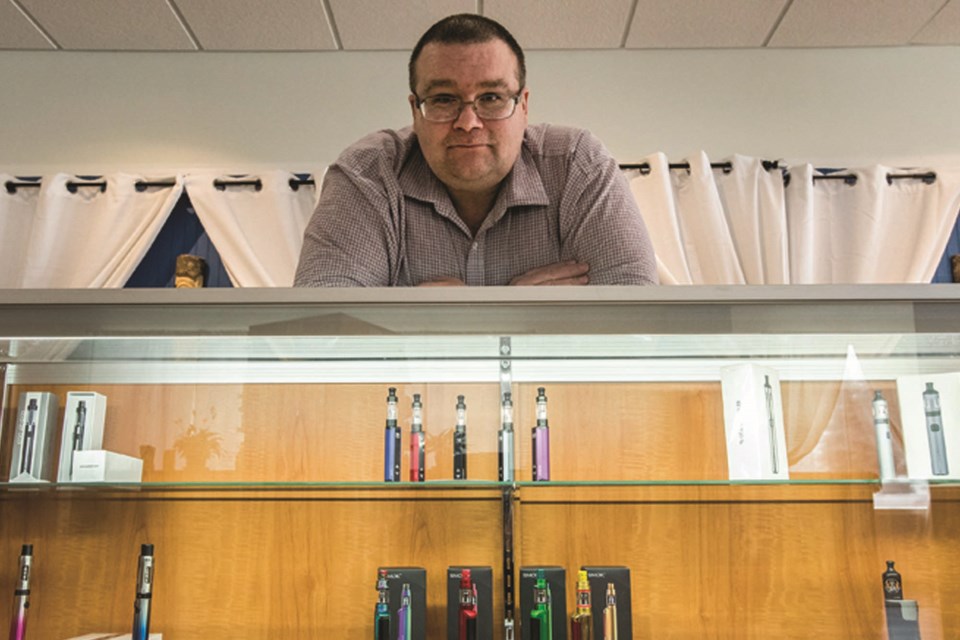A St. Albert vape shop owner is one of many across the country who are demanding the London, Ont., medical officer release the name of the brand that caused a serious illness in a teen.
Thomas Kirsop, owner of Alternatives & Options in Morinville and St. Albert said he wants to know the name of the product that put an Ontario youth in intensive care to ensure his customers and consumers across the country are safe. Earlier this month, the teen became severely ill after using a vape and was put on life support.
“If you know what's making somebody sick and you withhold that information and somebody else gets sick because you won’t tell that information, that is not public health,” Kirsop said.
Last week at a news conference, Dr. Chris Mackie of the Middlesex-London Health Unit said the teen's illness was linked to vaping, but refused to release what product the teen had used.
In a series of email exchanges between the industry advocates and the doctor, shop owners and manufacturers have been asking for the product name to be released. Some shop owners have resorted to sending Mackie lists of their inventories to learn whether or not they sell the product in question.
“Now that we have a concern, now that we know we have identified a product, I want to make sure that product is not in my inventory,” Kirsop said.
Kirsop has been assured he is not selling the product, but says he is still not satisfied.
“Without knowing what the product is, I can’t even gauge my concern. Is it a black market product? Is it a legitimate product? Is it a legitimate product with national distribution? We can't even start to answer those questions until the doctor releases the information about what the product was.”
Kirsop said he is also concerned about new products he brings into the store and is worried he will need to check every new product through Ontario health officials.
“I haven't had more than four hours of sleep in a week.”
Kirsop said his business has taken a hit because of the uncertainty, as some of his customers have gone back to smoking cigarettes.
Deena Hinshaw, doctor and Chief Medical Officer of Health in Alberta, said because vaping is a new trend, the health impacts are relatively unknown.
“I think we know that vaping has risks, we just don't know exactly what all those risks are yet because it is new,” Hinshaw said.
Hinshaw said a lung disease linked to vaping emerged over the summer. The disease has been identified mostly in the United States, where five people have died and hundreds have been hospitalized. Health officials are still investigating the cause of those illnesses.
“To date, that seems to be a very severe, acute reaction to some kind of component in some kinds of vaping liquids. And we don't know exactly what's causing it and what exactly the chemical is that is causing that problem," Hinshaw said.“All of those are things that are being investigated right now by the United States Center for Disease Control, because it is causing quite severe illness. And some of those cases are in people who are otherwise healthy young people and vaping seems to be the cause of this illness.”
Although there are risks associated with vaping, Hinshaw said it is less dangerous than smoking cigarettes, but because vaping is so new, officials aren’t sure how much less dangerous it is.
“We know from data available to us now that vaping and nicotine containing compounds would be less risky than smoking a cigarette from available evidence,” Hinshaw said.
That doesn’t mean the product is safe, Hinshaw added, as they bear the risk of nicotine addiction.
Both Hinshaw and Kirsop don’t recommend the device for anyone who isn’t a cigarette smoker.
“If you don't smoke, don't vape. There's some evidence that vaping can be a harm reduction approach to quitting smoking, but if it's being used for any other purpose, people are exposing themselves to risks unnecessarily,” Hinshaw said.
Kirsop said he recommends the product as a harm reduction strategy for smokers who have not been successful at quitting in the past.




